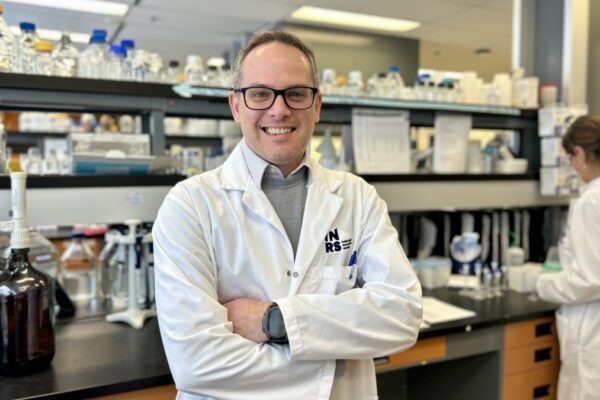- Research
What are the antimicrobial effects of stabilized natural products to ensure food safety and quality? This question is at the heart of the new research chair directed by INRS Professor Monique Lacroix.

Professor Monique Lacroix’s laboratories have been evaluating the antimicrobial and antioxidant potential of effective products that are less harmful to health.
In the food industry, the control of microbes, such as bacteria or viruses, often requires the addition of synthetic chemicals. Yet consumer demand for natural antimicrobial products is growing. This issue led to the creation of the chair, funded by the Ministère de l’Agriculture, des Pêcheries et de l’Alimentation du Québec and Agriculture and Agri-Food Canada, through the Canadian Agricultural Partnership.
For the past 26 years, Professor Monique Lacroix‘s laboratories have been evaluating the antimicrobial and antioxidant potential of various and effective products that are less harmful to health. Those products come from natural extracts including essential oils, fruits, spices and, more recently, silver nanoparticles. The financial assistance of $487,590, granted under the Partnership Program for Innovation in Agriculture, will allow these natural solutions to be further developed.
Natural solutions
To date, the challenge in using natural antimicrobial extracts has been their instability. “Some of the extracts oxidize quickly or are volatile. There is also variability in their composition and their interactions with the different nutrients in foods,” explains Professor Lacroix. These limitations where the safety should be assured.
“In food systems, it is important to consider all the parameters affecting yields and to develop standardized and stabilized processes whose components act in synergy.”
Monique Lacroix, specialist in sciences, applied to food
This funding will make it possible to develop different stabilization methods, such as food coating via immobilization in edible polymers. We can also think of nanoemulsion, encapsulation in microbeads, liposomes or biodegradable nanocomposite packaging films or developed from natural polymers.
Antimicrobial properties
The project is also evaluating the possible interactions between food composition, processing and storage conditions, and the resulting antimicrobial activity. The new chair will characterize the antimicrobial properties of natural extracts, such as essential oils, or fruit extracts. Bacteriocins produced by probiotic bacteria or by ferments, which are proteins or peptides generated during the fermentation of lactic bacteria, will also be studied. It will thus be possible to optimize the fermentation conditions for the production of antimicrobial bacteriocins. It is, among other things, by developing processes containing these extracts acting in synergy, under optimal concentrations, that the components will be standardized and stabilized. They will thus be able to meet the needs of various applications.
Professor Lacroix will collaborate with Professor Annie Castonguay and Professor Steven Laplante for the chemical analysis of the composition of the different extracts. It will contribute to a better understanding of the relationships between the structure and the antimicrobial activity of the extracts. The development of chemometric predictive models (classification of extracts) will provide the necessary information for the development of standardized antimicrobial formulations.
About Monique Lacroix

Professor Lacroix has made outstanding contributions to food science over the past 34 years. She is a prominent member of numerous expert committees in microbiology and irradiation at the World Health Organization and the International Atomic Energy Agency. She was recently named a Fellow of the Institute of Food Technology (IFT) in the United States for her commitment and leadership in the field of food quality and safety.



